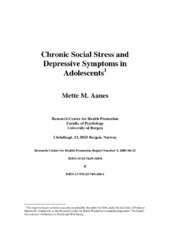Chronic Social Stress and Depressive Symptoms in Adolescents
Abstract
The participants in this cross-sectional study were Romanian students in secondary and high schools in Bucharest. The data were collected with the assistance of the Youth to Youth Foundation of Romania. The study was conducted during February/March 2002. The sample frame of the survey was all students in all secondary and high schools in Bucharest. In each of eight randomly selected schools, classes were randomly selected resulting in a study sample of 728 students. The questionnaires were filled out during a regular school hour, giving the students adequate time to answer the questions (n=630). The questionnaire contained the Subjective Health Complaints Scale (SHCS) as a measure of psychological distress, the Bergen Social Relationships Scale (BSRS) and the (adapted) Bergen Worries Scale (BWS-C) as measures of stress, and the General Self-efficacy (GSES) and the Social Self-efficacy (SSES) scales as measures of individual coping resources. In addition, the questionnaire contained a number of single-items designed to measure social support. The results of the study showed that the prevalence of chronic social stress among adolescents in the sample was high; 66% of girls and 57% of boys reported three or more stressors. This is higher than similar figures reported for Norwegian adults, but largely in line with results found for Romanian adults in previous studies. The results supported hypothesis 1; girls reported higher levels of both depressive symptoms and social stress, and the effects from social stress on depressive symptoms were larger for girls than for boys. Hypothesis 2 was also largely supported, there was a significant relationship between chronic social stress and depressive symptoms. This result was particularly clear for girls, for boys the relationship between chronic social stress and depressive symptoms was weaker, and only significant in one of the regression models of the study. Hypothesis 3 found strong support in the study; personal worries were found to be significantly and strongly related to depressive symptoms for both girls and boys. Hypothesis 4 was only partially supported. Most of the social support items did not show a significant relationship to depressive symptoms, with the exception of ‘perceived availability of a confidant’, which was significantly related to depressive symptoms for boys. Social self-efficacy was significantly related to depressive symptoms for girls but not for boys. General self-efficacy was not significantly related to depressive symptoms for either gender.
Description
This report is based on thesis research completed by the author in 2004, under the direction of Professor Maurice B. Mittelmark, in the Research Centre for Health Promotion’s research programme ‘The Social Environment’s Influence on Health and Well-being’.
